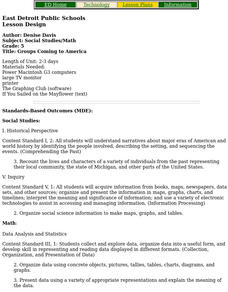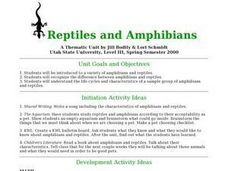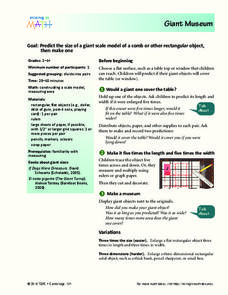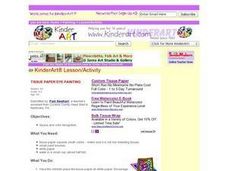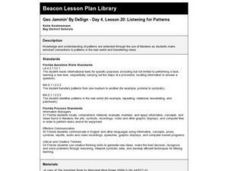Curated OER
Narrow it Down: Numbers
Elementary learners of all ages utilize their number knowledge by playing a 20 questions style game. They participate in a game in which they ask yes or no questions to a group leader in order to discover which number the leader has...
Curated OER
Native Americans - Searching for Knowledge and Understanding
What do you know about American Indians? Upper graders compose an informational essay based on the research they conduct. They choose a Native American group to study and, using the provided list of web links, gather information and...
Curated OER
Essential Elements of Habitat
First graders compare their local area with the Belize landscape. They construct maps of the school area, adding descriptive information. They write haiku poems about their favorite outside places.
Curated OER
Math -- Money
Students identify a penny, nickel, dime, quarter and a half dollar. They examine the value of each coin and its equivalents (to quarter/dollar). After pairing up with a classmate, each one drills the other one on each coin.
Curated OER
Length, Weight and Measures
Students complete measurement activities. For this measurement lesson, students watch online clips about measurements. Students view items and discuss taking measurements of them. Students discuss what units of measurement and equipment...
Curated OER
Groups Coming to America
Fifth graders use text or other references to locate different types of information about the Mayflower and pilgrims. They create a presentation for lower elementary classes about the Pilgrims.
Curated OER
Activity Plan 4-5: Riddles by the Bagful!
Young scholars write a riddle to be included in a class riddle book. In this creative-thinking lesson, the teacher will introduce children to riddles, then guide children through the process of writing and illustrating their own riddles...
Curated OER
Animal Adaptations
Animal adaptations, such as camouflage, are high-interest topics that are easily integrated into both reading and math curriculum.
Curated OER
The Anaconda
Students examine basic facts about the anaconda. They discuss the length of an anaconda, estimate the length of 33 feet, compare their estimate to the actual length, and decorate the paper snake with colored scales.
Curated OER
A World Of Matter
First graders complete a variety of experiments with solids, liquids and gases. They read books about matter, identify the characteristics of solids, liquids and gases and the sort and classify a variety of matter. Students make...
Curated OER
The Big O
Students investigate the characteristics of a community. They investigate the characteristics of the Omaha community through internet research and discussion. Students create books about their community.
Curated OER
Giant Museum
Scholars make a giant scale model of an object. They will take a regular item and enlarge it to five times its length and width. They attempt this same concepts with a 3D model.
Curated OER
Interpreting Graphs and Analyzing Data
Students investigate graphs and analyze the data displayed in the graph. They read a graph reflecting the birthday data for the students to read and analyze. Students use the graph to determine the number of birthday cards they need to...
Curated OER
Place Value Tens and Ones
Students use manipulative to identify the ones and tens digit in a number, use pictorial representation to identify the ones and tens digit in a number and determine the value of a number given tens and ones.
Curated OER
Tissue Paper Dye Painting
Use tissue paper squares to create collage art. Young artists discuss colors as they place and glue each piece of tissue on the paper. Tip: Cut out large basic shapes instead. Have the class create images using the tissue shapes (robots...
Curated OER
Graphing Memories
Mem Fox’s Wilfrid Gordon McDonald Partridge provides the labels for a graphing activity. Class members create an illustration of a memory item brought from home, and place their illustration in the proper column of a graph. When the...
Pennsylvania Department of Education
Shapes Around Us
Learners use manipulatives to study shapes. They sort shapes and use correct geometric terminology to describe them. Students find real-life examples of 2 and 3 dimensional shapes, and classify figures in their classroom according to...
Curated OER
Funerals and Burial Rites
Ninth graders research burial practices that originated in West Africa and then migrated to the South Carolina and Ohio. They compare and contrast burial practices in both places. As students collect information and data, they organize...
Curated OER
The King's Chessboard
Middle schoolers speculate on the better rate of pay: a dollar a day for 10 days, or a penny the first day, two pennies the second, doubling each day for 10 days. Start by listening to the story The King's Chessboard, by David Birch....
Baylor College
Dust Catchers
In class, your emerging environmentalists construct dust catchers. They take them home for a week or two, and then bring them back into class to examine under a magnifier. From this activity, they learn what makes up dust and that...
Curated OER
Number Sense Sampler
First graders illustrate a math problem with counters while reading story books, such as Margie Burton's "Add the Animals". They demonstrate a positive learning attitude toward mathematics and communicate clearly in oral, artistic,...
Curated OER
Digit Reversal Correction: 6 Doesn't Mix
Students practice methods of remembering by association. In small groups, children explore directions of numbers. Students practice procedures for digit reversal correction.
Curated OER
Beep, Beep, Vroom, Vroom
Students practice identifying, creating and labeling simple patterns. They recreate patterns in used in Stuart Murphy's book, Beep, Beep, Vroom, Vroom.
Curated OER
Geo Jammin' By Design: Listening for Patterns
Students listen to the teacher read a book and participate with guided questions. They discuss patterns and how they repeat, by looking at quilts. They design their own quilt block to create a class quilt.







